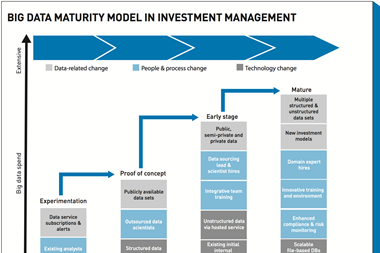Rosenberg Equities, the quantitative investment arm of AXA Investment Managers, has begun using a form of artificial intelligence in its investment process.
The company announced today that it had introduced “advanced modelling techniques that specifically utilise neural networks”.
Rosenberg has incorporated a neural network system into its sustainable equity strategy. The company said the new model would “improve the strategy’s ability to identify stocks that are at risk of extreme price events”, as well as mitigate tail risks and ultimately seek to improve risk and return outcomes.
Neural networks are computer systems designed to “learn” information in a similar way to humans. The technology hit global headlines last year when DeepMind, a machine learning company owned by Google, used its algorithm to learn the boardgame Go and subsequently beat one of the world’s top players.
Gideon Smith, Europe CIO of Rosenberg Equities, said: “This is the first step in us using neural network techniques and advanced artificial intelligence in client portfolios, but is a natural progression of the advanced quantitative techniques we’ve adopted over the last 30 years.
“We believe this is a considered step and consistent with our investment approach of modelling and managing investment risk for clients. It’s an area where we have a wealth of knowledge and expertise and we are excited to leverage these techniques with the aim of improving client results in all areas of the investment process.”
The company is also looking at “unstructured data sets” to use alongside traditional financial data, including a language processing tool that can analyse various text-based filings from companies to monitor investor sentiment.
BNP Paribas cuts out oil and gas related assets
French financial services giant BNP Paribas will stop working with companies involved with extracting oil and gas from tar sands and shale methods. It has also declared it will not finance operations to extract oil from the Arctic region.
The company said it was “committed” to aligning with a global initiative to keep global warming below 2°C by the end of the 21st century.
Jean-Laurent Bonnafé, CEO of BNP Paribas, said in a statement: “We’re a long-standing partner to the energy sector and we’re determined to support the transition to a more sustainable world.
“As an international bank, our role is to help drive the energy transition and contribute to the decarbonisation of the economy. As we have announced, we’re committed to working with and supporting those energy sector partners who have decided to make environmental issues a central part of their business policy.”
The bank had previously announced a range of other aims, including €15bn of financing for renewable energy projects by 2020, €100m of investment in startup companies involved in energy transition projects, and withdrawal of financing for coal mines and coal-fired power plants.
JP Morgan to launch first European ETFs
JP Morgan Asset Management (JPMAM) is to list exchange-traded funds (ETFs) in Europe for the first time. The two strategies are based on strategies “typical of hedge funds”, the company said – specifically, a long-short equity product and a managed futures product.
The two funds will list on the London Stock Exchange “imminently”, JPMAM said.
Bryon Lake, international head of ETFs at JPMAM, said the launches would be the “first wave”, adding that the company was seeking to build out its “active, strategic beta and alternative beta ETF capabilities”.
The company currently runs $2.2bn (€1.9bn) through 13 ETFs listed in the US.









